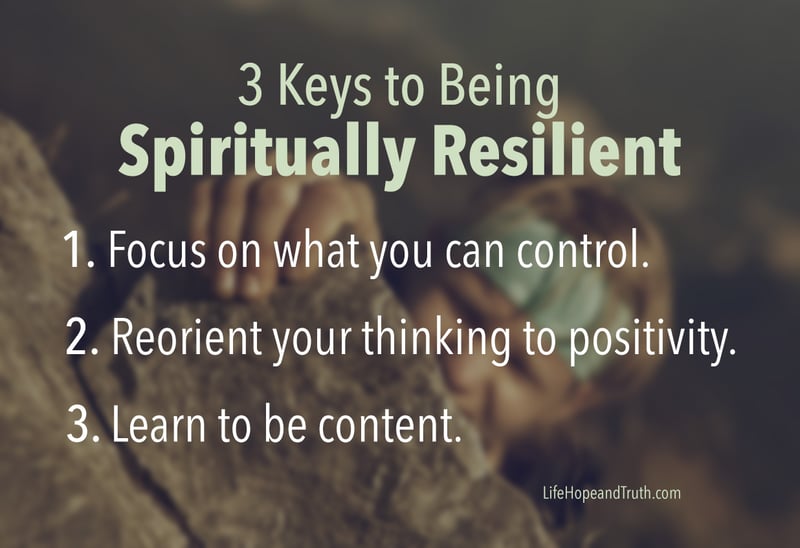Build Spiritual Resilience
Resilience allows us to deal effectively with the challenges of life. Resilience can help us to get beyond obstacles and adversities and succeed in life.

Stressors are all around us!
They include societal changes, wars and a variety of personal struggles (such as health, jobs and family). Times like these can create worry and anxiety because we human beings often don’t respond well to stressors.
Are there positive and constructive ways to deal with problems and trials in life?
There are! In this blog post, we are going to look at just one of them—resilience.
Resilience is defined as “springing back; rebounding. Returning to the original form or position after being bent, compressed, or stretched.”
In everyday language, this means that when you are knocked down, you get up. When you’re pushed back, you press forward. When you are out of options, you create new ones and find a way to move on.
In other words, a resilient person is not easily defeated. He or she finds ways to continue going forward, despite obstacles and adversities.
What does a spiritually resilient person look like?
Resilience is a product of mental discipline. Resilient people develop mental habits that allow them to maintain their bearings in times of stress and bounce back from adversity. Rather than focusing on the things causing stress and anxiety, resilient people set well-defined goals and maintain focus on those goals.
To be resilient, a Christian must focus on the promises of God contained in the Bible—the main promise being eternal life in the Kingdom of God. This provides a timeless standard that gives hope and achievable goals. The hope of the Kingdom of God is unmovable and sure, regardless of the difficult reality we are dealing with.
To learn more about focusing on this goal, read “What Is the Meaning of Matthew 6:33?”

Three keys to being spiritually resilient
There are mental habits that can, if consistently applied over time, help us become resilient. Here are three daily thinking habits to put into practice.
1. Focus on what you can control.
Focusing our attention on things we cannot control is a poor use of our time and energy.
Resilient people learn how to redirect their thinking to address things they can change—things that are impactful and directly affect their lives. Sometimes areas outside of our control may be more interesting and what we naturally want to focus on. But we can make real progress only when we focus on our own lives, the one thing we have control over.
The factors beyond our control will continue, with or without us.
From a practical standpoint, persistent focus on areas outside of our control can lead to worrying, fretting and emotional distress. The French philosopher Michel de Montaigne said: “My life has been filled with terrible misfortunes, most of which never happened.” In 2017, Huffington Post cited a study showing that 85 percent of what we worry about never happens. While the other 15 percent are things that happen, the study showed we can deal with them or learn valuable lessons from them.
This tells us that we shouldn’t worry!
For more insight on this, read “How to Gain Control of Your Life When You Feel Helpless.”
2. Reorient your thinking.
Our society is in a period of rapid change, and world events are increasingly troubling. We must develop mental tools to handle these stressors. We have no control over society around us, but we do have control over what we allow into our minds and what we choose to dwell on. This requires mental discipline. It can be difficult and requires daily practice.
The resilient will also look at problems and trials as opportunities for growth, not as insurmountable obstacles.
The quality of our lives is one thing we do have control over, and it begins in the mind. Facts don’t change, but our mental outlook can. It’s beneficial to critically analyze what we listen to, watch on social media and read. Is it quality and worthy of our time? If not, replace it with something that is.
The Bible gives us many positive things to focus on. Philippians 4:8 gives us eight positive and godly topics to think about.
Reorienting our thought processes will provide stability in an otherwise chaotic and unstable world.
For more insight on spiritually healthy thinking, read “Finding Peace of Mind” and “Bring Every Thought Into Captivity.”
3. Learn to be content.
There’s a famous phrase that goes, “It is what it is.”
This is not negative, but rather a recognition that, at times, we will need to learn to patiently deal with disappointment and stressors. We can’t reinvent reality, but our perspective on it can make a difference. Contentment allows us to mentally deal with life’s ups and downs and maintain a balanced perspective.
The Bible tells us that learning to be content is vital. Paul wrote that “godliness with contentment is great gain” (1 Timothy 6:6). This is something that Paul had to learn to practice throughout his life because of the many trials he faced (Philippians 4:11).
To learn more about this needed quality, read “What’s the Real Source of Contentment?”
We will not always be successful in our endeavors to practice these three keys. But while this process may not come naturally to us, it can be learned over time.
There is no better time to develop spiritual resilience than now!
To learn more, read “Perseverance and the Science of Resilience in Trials
Date Posted: May 12, 2022



